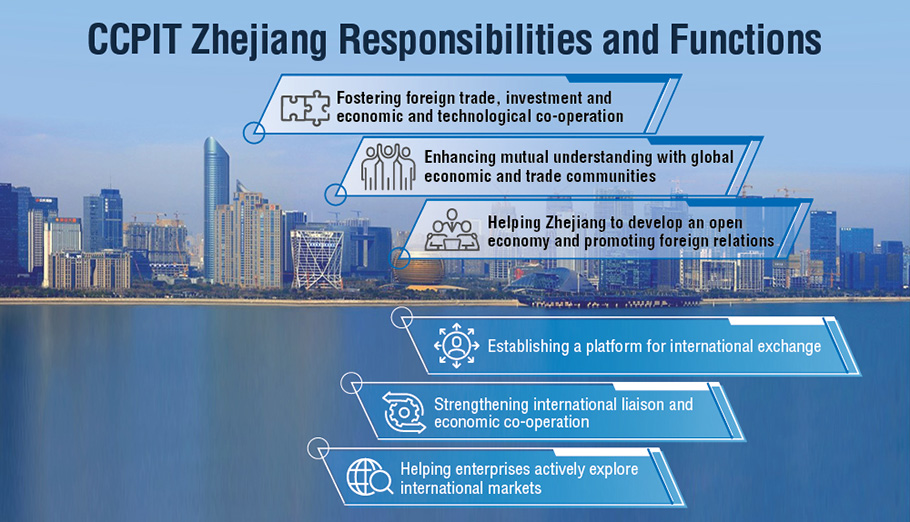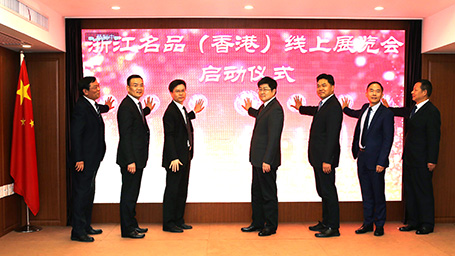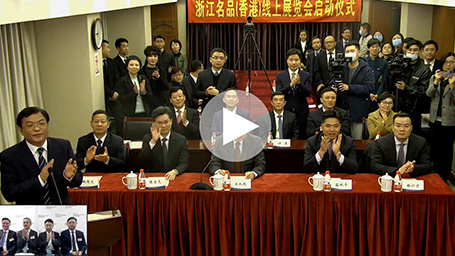Zhejiang Province is located on the southern wing of the Yangtze River Delta, which lies along the southeastern coast of Mainland China. It has established direct economic and trade relations with more than 230 countries and regions around the world, making it a stronghold for foreign trade. The China Council For The Promotion Of International Trade Zhejiang Provincial Committee (CCPIT Zhejiang) is a leader in promoting trade, investment, economic activities and mutual understanding between Zhejiang and the rest of the world.
With Hangzhou as its capital, Zhejiang administers 11 municipalities that include Hangzhou, Ningbo, Wenzhou, Huzhou, Jiaxing, Shaoxing, Jinhua, Quzhou, Zhoushan, Taizhou and Lishui. Under these municipalities, there are 37 municipal districts, 20 county-level cities and 33 counties.
Zhejiang has a long history and has inherited an impressive cultural legacy. It is one of the birthplaces of ancient Chinese civilisation and is known as the land of fish, rice, silk and tea. Its cultural relics have long been popular tourist attractions.

Abundant resources enhance economic strength
Zhejiang has a well-developed market-oriented economy. Its openness and inclusiveness guarantee an edge in doing business and fostering innovation. It is one of the fastest growing and most dynamic provinces in Mainland China. In 2019, its provincial GDP reached RMB6.235trn (US$903.9bn), ranking fourth in Mainland China (excluding Hong Kong, Macao, and Taiwan), a rank it has maintained for 24 consecutive years, while the per capita GDP of the province was RMB107,624 (US$15,601). The per capita disposable income of urban and rural residents stood at RMB60,182 and RMB29,876 respectively, ranking first in Mainland China (excluding Hong Kong, Macao and Taiwan) for 19 and 35 consecutive years respectively.Private sector nourishes world-famous enterprises
Both Geely Holding Group and Internet technology giant Alibaba are “World Top 500” companies that are headquartered in the province. More than two million private enterprises and 458 listed companies have set up their base in the province. In 2019, Zhejiang accounted for 92 of the top 500 private enterprises in Mainland China, ranking it first among the country’s provinces, a rank it has kept for 21 consecutive years.
Specialised market networks foster commodity trading
Zhejiang is a major area for specialised markets. There are a huge number of commodity trading markets that are large in scale, strong in comprehensive capabilities and wide in reach. The province has formed a commodity trading network centred on consumer goods and production materials, supported by many other supplementary markets. In 2019, there were 3,783 commodity markets of various kinds across the province (among them, 274 are billion-dollar-level, 39 are 10-billion-dollar-level and two are 100-billion-dollar-level), and annual transaction volume reached RMB2.3trn, ranking it first in the country in terms of both number of markets and transaction value. Moreover, the province is home to Yiwu Chinese Small Commodity City, the world’s largest small commodity trading and distribution market, and Shaoxing Chinese Textile City, Asia’s largest textile trading market. It is also home to Taobao.com, Mainland China’s largest online retailer.Building a world-class advanced manufacturing base
Zhejiang, as a major manufacturing province, is committed to building a world-class advanced manufacturing base. The province is expediting the construction of world-class advanced manufacturing industrial clusters, including those with an output value of more than RMB100bn, such as digital security, automobile and automotive parts, green petrochemicals, and advanced textile and apparels. The province is focused on fostering the top 10 iconic global industrial chains, which includes digital security, refinery-petrochemical integration and new materials, energy-saving and new energy cars, advanced textiles, integrated circuits, CBD (cloud computing, big data, deep learning), network communications, smart devices, smart homes and bio-pharmaceuticals.Zhejiang has cultivated an economy that exhibits strong regional specialities. The province’s clustered industrial sectors cover more than a dozen industries such as manufacturing, processing, construction, transportation, cultivation, textiles, trade and services. There are more than 100 industrial professions and over 30 agricultural and by-product processing industries. Yueqing low-voltage electrical appliances, Haining leather garments, Yongkang hardware products, Zhuji pearls, Shengzhou neckties and Pujiang crystal artefacts are well-known throughout the country. At present, the province has more than 500 economic clusters with a total industrial output value of more than RMB100m, among which products of 52 clusters register a domestic market share of more than 30 per cent.
Foreign trade registers trillions of renminbi in transactions
Zhejiang has a thriving foreign trade network. It has established direct economic and trade relations with more than 230 countries and regions in the world. In 2019, Zhejiang’s imports and exports of products totalled RMB3.083trn, of which exports comprised RMB2.307trn (exports of mechanical and electrical products, and hi-tech products accounted for 43.9 per cent and seven per cent respectively), and imports comprised RMB776.2bn. Contracted foreign investment of the province stood at US$43.65bn with US$13.56bn realised. In that year, 763 foreign enterprises and institutions were approved and filed overseas direct investment amounted to RMB83.08bn.
CCPIT Zhejiang fully committed to promoting trade and investment
 The China Council For The Promotion Of International Trade Zhejiang Provincial Committee (CCPIT Zhejiang) was established in June 1959. It is the most authoritative organisation for promoting trade and investment in Zhejiang. CCPIT Zhejiang connects the government with entrepreneurs, enterprises and relevant associations and institutes. It also acts as an essential link for economic co-operation between Zhejiang and the rest of the world and as a vital force helping the province to develop an open economy and promote foreign relations. The primary responsibility of CCPIT Zhejiang is to foster trade, investment and economic and technological co-operation between Zhejiang and the rest of the world in accordance with international practices. It is also committed to enhancing mutual understanding and friendship with people and economic and trade communities around the world.
The China Council For The Promotion Of International Trade Zhejiang Provincial Committee (CCPIT Zhejiang) was established in June 1959. It is the most authoritative organisation for promoting trade and investment in Zhejiang. CCPIT Zhejiang connects the government with entrepreneurs, enterprises and relevant associations and institutes. It also acts as an essential link for economic co-operation between Zhejiang and the rest of the world and as a vital force helping the province to develop an open economy and promote foreign relations. The primary responsibility of CCPIT Zhejiang is to foster trade, investment and economic and technological co-operation between Zhejiang and the rest of the world in accordance with international practices. It is also committed to enhancing mutual understanding and friendship with people and economic and trade communities around the world.CCPIT Zhejiang has five functional departments and established the Zhejiang International Commercial Legal Service Centre and two companies specialising in trade and exhibition operations as its functional arms. It is managed by a team of international, professional and disciplined personnel. Its trade promotion network covers all cities, counties and sectors in the province and it is an important force helping the province to develop an open economy and promote foreign relations.


Enhancing international ties and economic co-operation
As a civil trade ambassador, CCPIT Zhejiang endeavours to expand its global ties and promote international co-operation. It strives to integrate into the international commercial family and by the end of 2019, it had established friendly and co-operative relations with 175 business associations and economic and trade organisations in 79 countries and regions. CCPIT Zhejiang has established a platform for international exchange and attaches great effort to strengthening international liaison and economic co-operation. It has deployed delegations to participate in the 9th, 10th, and 11th World Chamber of Commerce Conferences, the G20 Leaders Hangzhou Summit, and APEC bilateral and multilateral trade negotiations. It hosted “Zhejiang Day” at the 2017 Astana Expo in Kazakhstan and more recently at the 2019 Beijing World Horticultural Exposition. On the international stage, the professional demeanour of Zhejiang’s trade promotion personnel and entrepreneurs is well-known.As one of the earliest exhibition organising agencies in Mainland China, CCPIT Zhejiang fully utilises its edge in international exhibitions and helps enterprises actively explore international markets. Its efforts see tens of thousands of enterprises participating in world-renowned professional exhibitions. The Zhejiang Commodities Fair is held in more than 10 overseas countries and regions each year. The Committee also hosts a number of high-profile and influential fairs and exhibitions in the province. Moreover, exhibitions dedicated to emerging industries such as digital education, service trade and culture are on the agenda.
The China Chamber of International Commerce Zhejiang Chamber of Commerce working under the China Council for the Promotion of International Trade Zhejiang Provincial Committee maintains close ties and co-operation with the International Chamber of Commerce. It has more than 33,000 member units covering all cities in the province. The members include enterprises in equipment, mechanical and electrical products, automobiles, medical equipment and healthcare, food and agricultural products, and service trade. By the end of February 2020, there were 35 overseas representative offices in 33 countries.



